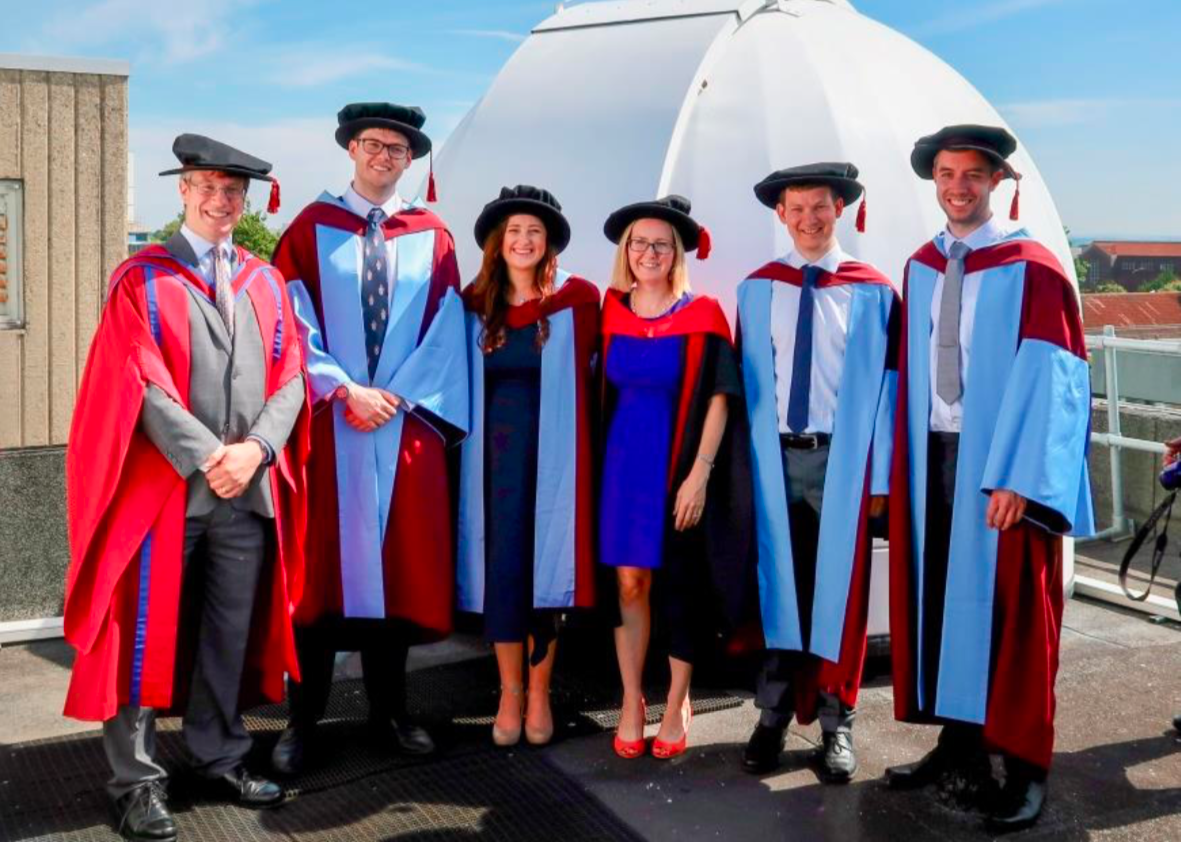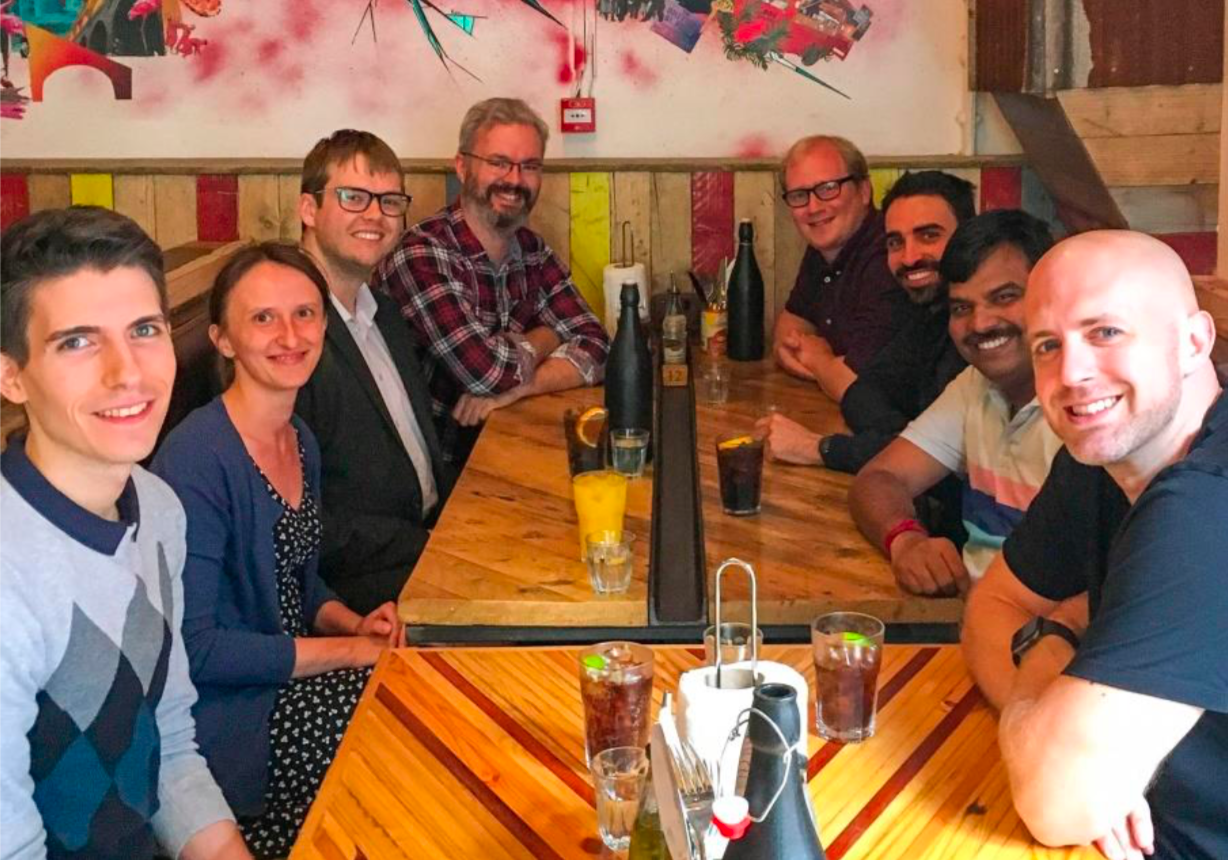MIST
Magnetosphere, Ionosphere and Solar-Terrestrial
Applying for jobs as a recovering academic
by Stephen Browett
Last year I finished my PhD from the University of Southampton and I am now working as a Technical Analyst for a tech start-up in my hometown of Birmingham. This blog post describes a very honest account of how I tackled the hardest problem I faced after finishing my PhD: working out what I wanted to do next. I hope that this helps people who are unsure about moving into industry and need advice on how to go about making decisions on their future career.

Full disclaimer: at the time that I was walking out of the door at Southampton I had no industry experience of any kind, I did not have any idea what I wanted to do and I did not have any connections with anyone in industry who could offer me a job; all I had was a piece of paper saying I had a PhD.
#PhDone! What next?
Deciding to leave academia was a hard decision to make, especially when completing a PhD provides an incredible sense of accomplishment. I was very tempted to stay in academia because of that feeling and, I am sure, some of those who are undecided about what they want to do following a PhD stay in academia because of it; however, for me it was not enough and I decided to “sell out” (as some of my friends lovingly put it) and get a “real job” (as I lovingly put it to some of my friends) in industry.
How I figured it out
Deciding to move into industry immediately presented the most difficult question: “what do I want to do now?” In order to answer this question I took a pragmatic approach which started by listing all of the parts of doing a PhD that I had enjoyed. For me, this list comprised of: designing and implementing original analyses; coding in Python; working as part of a team and presenting results. This list gave me some criteria to check every job advert against so that I could make a decision as to whether or not I felt capable of doing that job (beware imposter syndrome at this point, you can do more than you think!).
A list of criteria for a job is all well and good but is useless unless that job also motivates you; a job needs that special something that takes it from “I could do that” to “I want to do that”. For example, I have spoken to people who want to feel like they are making an impact at a company; some people want to feel like they are changing the world; and others want good progression opportunities. All of these are perfectly legitimate requirements and each person will have different priorities. I wanted to be able to dictate the direction of my own work. This is something we get to do a lot during our PhDs and I felt that I needed that creative outlet that comes with self-autonomy. Personally, I had several interviews where I came out at the end thinking “that place is really boring!” which, in the end, meant that I decided to withdraw from the application processes; remember that a company should also be trying to impress you during an interview, if they are not trying hard enough then are they not that interested?
The combination of my list of criteria for a job as well as my own priorities and interests had made me decide that I wanted to work in the tech sector but which job I wanted specifically was still very much undecided. In the Venn diagram of all the jobs that exist, I knew I was looking for the intersection of the set of jobs that I wanted to do and the set of jobs that I was qualified to do. Having decided on what jobs I wanted to do, I then needed to turn my attention to defining the set of jobs that I was qualified to do. In order to tell what job you are qualified to do when you have no experience is not an easy task (especially as it requires detailed self-analysis) so you have to analyse all of the work you have ever done and come up with a list of your skills (with some painfully contrived examples of when you used those skills) to put on a ‘skills based’ CV. The kind of skills I decided I had included coding (Python), problem solving (PhD, duh!) oral and written communication skills and the ability to teach myself new skills (this is always a good one). Putting this list together made me realise what doing a PhD had made me learn and that those days scratching my head over a problem, which felt like wasted days at the time (as is the pressure of doing a PhD), were actually days where I was adding another string to my bow which I can now show to potential employers. This kind of introspective analysis, however, does not come very easily to me and so this is when a visit to the university’s careers advice centre really helped out. These career advice centres are really useful places and after only a couple of meetings (only one of which was actually scheduled with them) at the centre on Southampton’s Highfield campus I had a CV and covering letter that I was very proud of and, after discussions around my skill set with a careers advisor, I had decided I wanted to be a data scientist or data analyst.
Getting that dream job!
Applying for jobs made me realise another gift from the PhD in that it opened doors. I was being contacted about jobs I had not applied for (some were offering salaries 5 times what I was getting from my PhD stipend). Recruiters pay to have access to CVs that people post onto job board sites and share the good ones with their colleagues and so I was getting contacted about all kinds of jobs and the recruiters could not do enough to try and find me a job I wanted (albeit so that they would get paid by the company who hires me but there is still a compliment in there) all because I had ‘Dr’ in my title. It was not long before I was contacted about a job at a tech start-up company called Covatic. They were looking to establish a research and development team in Birmingham and so were looking for highly educated/ well experienced people to set it up. I was asked if I would be interested in applying for a Technical Analyst role which comprised of various research and data science projects that I would be able to specify in conjunction with the data scientist and Chief Technical Officer, I told them I was very interested. I kind of flunked the phone interview, this was the first job I had found which I was really interested in and I let the pressure get to me but, fortunately, they had seen something in me because they invited me in for a face-to-face interview. I was determined not to fail this one as well so I took every bit of information I could from the telephone interview and pored over anything that looked relevant in my PhD notes. As a result the physical interview went much better and ended up with me and the data scientist riffing about ideas for potential data projects and what technical challenges we would have to overcome. Both of us found this very exciting and I think it is what ultimately led to a job offer which I eagerly accepted.
At the time of writing this article I have been working at Covatic for nearly a year but, due to the timing of my viva, I have only graduated a few weeks ago. Going back to university after time away from it afforded me the opportunity to reflect upon my decision to leave and the personal progress that I have made since leaving. I feel that whilst I miss the university lifestyle, I have had so much more opportunity to improve my technical abilities in industry and, as a result, I have become much more confident in myself and my abilities. So, one year after starting my job and having just hired a junior with whom I will start up my own team within the company, I have no doubt that moving into industry was the best thing for me to do.

Further reading:
- Creating different types of CV: https://www.theguardian.com/careers/cv-templates
- Good websites to search for jobs:
https://www.indeed.co.uk (covers a wide range of industries)
https://www.cwjobs.co.uk (tech specific)
https://stackoverflow.com/jobs (tech specific)
- Stack overflow has an amazing page of insights into which technologies are in demand: https://insights.stackoverflow.com/survey/2018#overview
If you have any questions about finding your career path post-PhD then you can This email address is being protected from spambots. You need JavaScript enabled to view it..